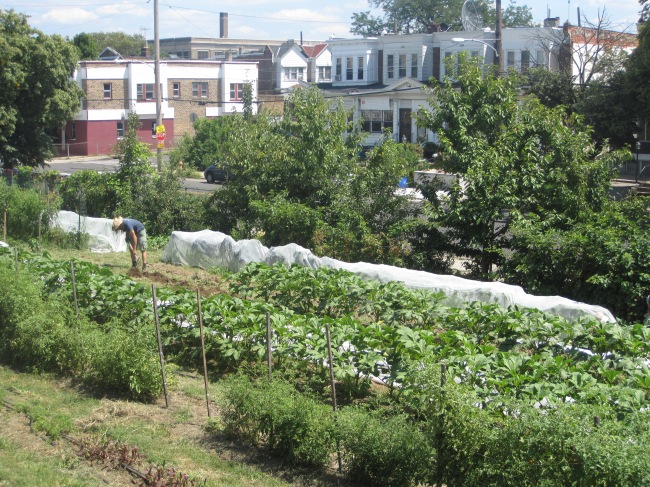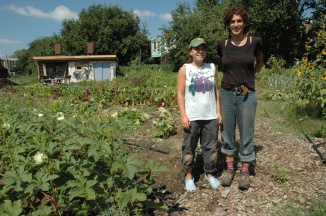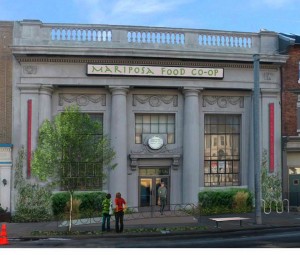Mari Gallagher’s response to the NYT article “Studies Question Pairing of Food Deserts and Obesity” from April 18, 2012:
This is in response to the lengthy but flawed New York Times article
on food deserts and obesity that appeared on April 18. I write from
the perspective of a researcher who has been deeply engaged for many
years in these matters and whose studies have helped stimulate
solutions in my hometown of Chicago as well as other parts of the
nation.
The Times piece begins with a misstatement that policy makers and
first lady Michelle Obama think that all poor urban areas are food
deserts. There are many poor urban areas in which residents do have
significant access to healthy food options. But food deserts can and
do exist in urban, rural and even suburban locations. In Chicago, many
food desert residents are poor. We also identified more than 12,000
food desert households that earn $100,000 or more annually.
Ms. Kolata, who wrote the Times story, states, “It is unclear how the
idea took hold that poor urban neighborhoods were food deserts,” but
there is really nothing unclear about it at all. The existence of food
deserts in many U.S. cities is not an idea, but an established fact.
Our research firm popularized the term “food desert” in the U.S. in
2006 with the release of a report titled Examining the Impact of Food
Deserts on Public Health in Chicago. Additionally, the National Center
for Public Research, of which I am the founding president, launched a
highly successful three-year food desert awareness campaign shortly
thereafter.
Once the awareness war was won, we retired the campaign to focus our
energy on a kaleidoscope of solutions that include – but certainly are
not limited to – improving healthy food access. Ms. Kolata named the
National Center for Public Research, but appears to have missed or
overlooked the details of the campaign or that my firm has found and
reported statistically significant relationships in Chicago between a
lack of access to nutritious food options and two crucial indicators
of negative health impacts: higher body mass index, which is a proxy
for obesity, and increased incidents of premature death by diabetes.
We found similar results in many other locations all across the
country, and so have many other researchers. In our latest study –
which took place on the East Coast and is being finalized for release
later this spring – we found a statistically significant relationship
between overweight newborns and poor food access, after controlling
for a number of factors (i.e. race, prenatal care, mother’s education,
mother’s age, mother’s alcohol use, mother’s tobacco use, marital
status and gestational age).

We have stressed throughout the course of our work that plopping down
a grocery store does not mean that these problems are instantly
solved. Yet Ms. Kolata’s article unfairly suggests that community
leaders, policy makers, Mrs. Obama, and so many others want to “combat
the obesity epidemic simply by improving access to healthy
foods.” [emphasis added] To my knowledge, no one of any credibility
has ever suggested that access was the entire solution or that
anything involving the complicated relationship between diet and
health is simple.
Healthy food access is a necessary and important foundation to build
upon – we cannot choose healthy food unless we have access to it.
Once we do have access, other factors that drive individuals to make
unhealthy food choices come into play. Behaviors do not change
overnight. We all have a lot of work to do. Thankfully, many different
community, policy, government and market leaders and organizations in
my hometown of Chicago and all across the country – including Mrs.
Obama – are working on aspects of this complicated and urgent problem.
Ms. Kolata’s summary of two recent studies on the link between child
obesity and access to healthy food was also misleading in several
respects. She fails to note the large number of studies that have
identified food deserts and the subsequent large number of studies
that have found a link between living in underserved areas and poor
health outcomes. The article fails to note the shortcomings of the two
studies it touts, even though the authors of those studies themselves
go to great lengths to describe those deficiencies.
Another shortcoming – again, discussed in these studies, but not in
the Times article –
concerns the failure to account for how access to food retailers is
different in suburban locations where automobile use is nearly
universal, compared to urban locations where fewer residents drive and
must travel on foot, by taxi, or by mass transportation to obtain the
food, nutritious or not, that makes up their daily diet. Lumping
suburban and urban places together in the analysis is inappropriate: A
retailer that is a few miles away might be reached in a drive of a few
minutes in a suburb, but this would take much longer on foot and on
public transportation in a city, with an even more difficult return
journey with sacks of groceries.
The article also does a disservice to all of us concerned about access
to nutrition by setting up a “straw man”: an imagined world in which
more grocery stores and improved access to healthy food is the only
solution to problems like obesity. Anyone who claims that access is
the silver bullet is indeed foolish. But our own research – and the
research of many others – makes no such claims. Education, for
example, can help people make better choices.
But all the knowledge in the world will not allow food desert
residents to choose healthy food if they do not have access to it.
Solutions to the challenge posed by obesity lie in both access and
education, and in more studies that reveal what works and what doesn’t
in changing peoples’ behavior. Cost, culture, and preference are also
factors. The solutions do not lie in the misleading presentation of a
few contrary findings, the limitations of which even their authors
readily acknowledge.
Our issue is not with the two new studies; we thank the authors for
their valuable contributions. Our issue is the reporter’s sloppy job
of getting the facts straight. Some of this could have been settled by
some simple Google searches. She muddied the water at best, misled at
worst, and left the inaccurate impression that food access and the
concept of food deserts does not matter.
Mari Gallagher
Institute on Urban Health Research
Northeastern University





